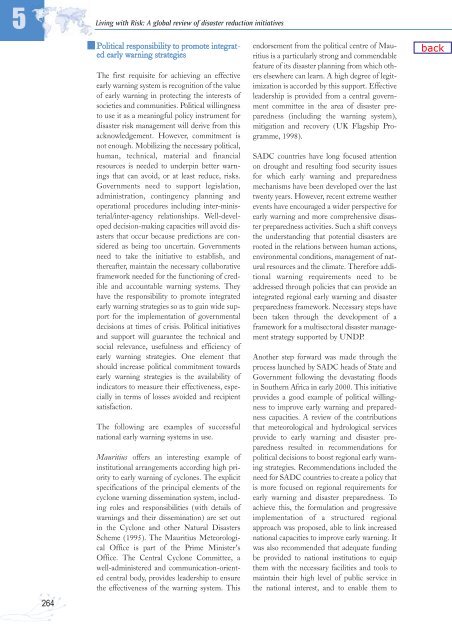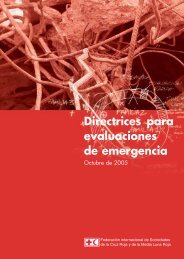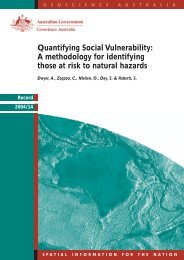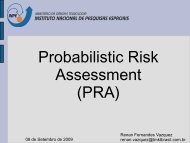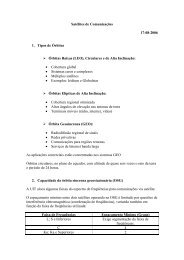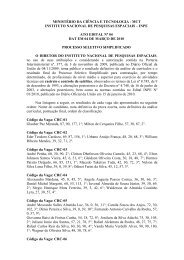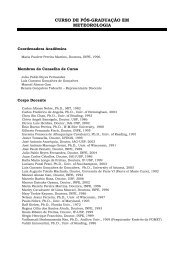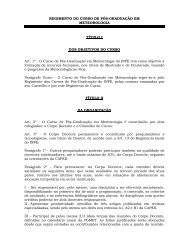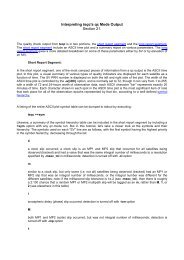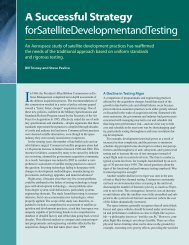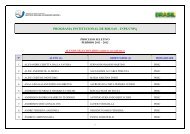Living with Risk. A global review of disaster reduction initiatives
Living with Risk. A global review of disaster reduction initiatives
Living with Risk. A global review of disaster reduction initiatives
Create successful ePaper yourself
Turn your PDF publications into a flip-book with our unique Google optimized e-Paper software.
5<br />
<strong>Living</strong> <strong>with</strong> <strong>Risk</strong>: A <strong>global</strong> <strong>review</strong> <strong>of</strong> <strong>disaster</strong> <strong>reduction</strong> <strong>initiatives</strong><br />
264<br />
Political responsibility to promote integrated<br />
early warning strategies<br />
The first requisite for achieving an effective<br />
early warning system is recognition <strong>of</strong> the value<br />
<strong>of</strong> early warning in protecting the interests <strong>of</strong><br />
societies and communities. Political willingness<br />
to use it as a meaningful policy instrument for<br />
<strong>disaster</strong> risk management will derive from this<br />
acknowledgement. However, commitment is<br />
not enough. Mobilizing the necessary political,<br />
human, technical, material and financial<br />
resources is needed to underpin better warnings<br />
that can avoid, or at least reduce, risks.<br />
Governments need to support legislation,<br />
administration, contingency planning and<br />
operational procedures including inter-ministerial/inter-agency<br />
relationships. Well-developed<br />
decision-making capacities will avoid <strong>disaster</strong>s<br />
that occur because predictions are considered<br />
as being too uncertain. Governments<br />
need to take the initiative to establish, and<br />
thereafter, maintain the necessary collaborative<br />
framework needed for the functioning <strong>of</strong> credible<br />
and accountable warning systems. They<br />
have the responsibility to promote integrated<br />
early warning strategies so as to gain wide support<br />
for the implementation <strong>of</strong> governmental<br />
decisions at times <strong>of</strong> crisis. Political <strong>initiatives</strong><br />
and support will guarantee the technical and<br />
social relevance, usefulness and efficiency <strong>of</strong><br />
early warning strategies. One element that<br />
should increase political commitment towards<br />
early warning strategies is the availability <strong>of</strong><br />
indicators to measure their effectiveness, especially<br />
in terms <strong>of</strong> losses avoided and recipient<br />
satisfaction.<br />
The following are examples <strong>of</strong> successful<br />
national early warning systems in use.<br />
Mauritius <strong>of</strong>fers an interesting example <strong>of</strong><br />
institutional arrangements according high priority<br />
to early warning <strong>of</strong> cyclones. The explicit<br />
specifications <strong>of</strong> the principal elements <strong>of</strong> the<br />
cyclone warning dissemination system, including<br />
roles and responsibilities (<strong>with</strong> details <strong>of</strong><br />
warnings and their dissemination) are set out<br />
in the Cyclone and other Natural Disasters<br />
Scheme (1995). The Mauritius Meteorological<br />
Office is part <strong>of</strong> the Prime Minister’s<br />
Office. The Central Cyclone Committee, a<br />
well-administered and communication-oriented<br />
central body, provides leadership to ensure<br />
the effectiveness <strong>of</strong> the warning system. This<br />
endorsement from the political centre <strong>of</strong> Mauritius<br />
is a particularly strong and commendable<br />
feature <strong>of</strong> its <strong>disaster</strong> planning from which others<br />
elsewhere can learn. A high degree <strong>of</strong> legitimization<br />
is accorded by this support. Effective<br />
leadership is provided from a central government<br />
committee in the area <strong>of</strong> <strong>disaster</strong> preparedness<br />
(including the warning system),<br />
mitigation and recovery (UK Flagship Programme,<br />
1998).<br />
SADC countries have long focused attention<br />
on drought and resulting food security issues<br />
for which early warning and preparedness<br />
mechanisms have been developed over the last<br />
twenty years. However, recent extreme weather<br />
events have encouraged a wider perspective for<br />
early warning and more comprehensive <strong>disaster</strong><br />
preparedness activities. Such a shift conveys<br />
the understanding that potential <strong>disaster</strong>s are<br />
rooted in the relations between human actions,<br />
environmental conditions, management <strong>of</strong> natural<br />
resources and the climate. Therefore additional<br />
warning requirements need to be<br />
addressed through policies that can provide an<br />
integrated regional early warning and <strong>disaster</strong><br />
preparedness framework. Necessary steps have<br />
been taken through the development <strong>of</strong> a<br />
framework for a multisectoral <strong>disaster</strong> management<br />
strategy supported by UNDP.<br />
Another step forward was made through the<br />
process launched by SADC heads <strong>of</strong> State and<br />
Government following the devastating floods<br />
in Southern Africa in early 2000. This initiative<br />
provides a good example <strong>of</strong> political willingness<br />
to improve early warning and preparedness<br />
capacities. A <strong>review</strong> <strong>of</strong> the contributions<br />
that meteorological and hydrological services<br />
provide to early warning and <strong>disaster</strong> preparedness<br />
resulted in recommendations for<br />
political decisions to boost regional early warning<br />
strategies. Recommendations included the<br />
need for SADC countries to create a policy that<br />
is more focused on regional requirements for<br />
early warning and <strong>disaster</strong> preparedness. To<br />
achieve this, the formulation and progressive<br />
implementation <strong>of</strong> a structured regional<br />
approach was proposed, able to link increased<br />
national capacities to improve early warning. It<br />
was also recommended that adequate funding<br />
be provided to national institutions to equip<br />
them <strong>with</strong> the necessary facilities and tools to<br />
maintain their high level <strong>of</strong> public service in<br />
the national interest, and to enable them to


